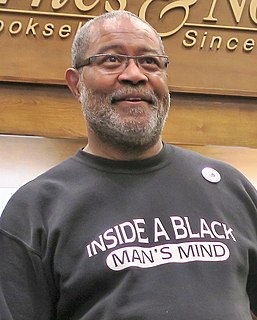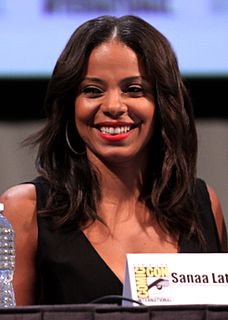A Quote by Mark Bradford
If power is abstraction, which many black men, black women, and people of color have very little voice in, well, then I want to sit at the table.
Related Quotes
They wanted black women to conform to the gender norms set by white society. They wanted to be recognized as 'men,' as patriarchs, by other men, including white men. Yet they could not assume this position if black women were not willing to conform to prevailing sexist gender norms. Many black women who has endured white-supremacist patriarchal domination during slavery did not want to be dominated by black men after manumission.
I, however, like black. It is a color that makes me comfortable and the color with which I have the most experience. In the darkest darkness, all is black. In the deepest hole, all is black. In the terror of my Addicted mind, all is black. In the empty periods of my lost memory, all is black. I like black, goddammit, and I am going to give it its due.
There are many things that black women can continue to do to help black folk. First, black women have historically been among the most vocal advocates for equality in our community. We must take full advantage of such courage by continuing to combat the sexism in our communities. Black women, whether in church, or hip-hop, don't receive their just due. Second, when black women are in charge of child-rearing, they must make ever so sure to raise black children who respect both men and women, and who root out the malevolent beliefs about women that shatter our culture.
We're looking at a story we want to call "Am I Black enough for you?" That's that whole question of who determines what "Black enough" is. Is it color? And if it's color, then are you telling me that Clarence Thomas is Blacker than Louis Farrakhan? If it's not color then what's the line that determines whether you are?
The black masses want not to be shrunk from as though they are plague-ridden. They want not to be walled up in slums, in the ghettos, like animals. They want to live in an open, free society where they can walk with their heads up, like men, and women! Few white people realize that many black people today dislike and avoid spending more time than they must about white people. This 'integration' image, as it is popularly interpreted, has millions of vain, self-exalted white people convinced that black people want to sleep in bed with them - and that's a lie!
I have this problem where it's like'I can never stop thinking. For instance, I find myself obsessing over the treatment of black women and girls by black men'the fact that black men have a special prejudice against black women and generally don't protect them or attempt to understand them, and I cry an awful lot about that.
...black women write differently from white women. This is the most marked difference of all those combinations of black and white, male and female. It's not so much that women write differently from men, but that black women write differently from white women. Black men don't write very differently from white men.
Black women are some of the most colorful women in the world. We come in all shadeshave so many hair textures..eye colors..body types. In this generation, it's sad to see so many black girls claiming ethnicities that they know nothing about in hopes of impressing a man or appearing 'exotic'. So many people act as if being black and beautiful is impossible. It's not. If we wanna get technical and look at our history, almost every black American is mixed. But we must stop implying that a woman's beauty comes from a part of her that is not black.
The inspiration for this movie [Something New] was this Newsweek article that came out a couple of years ago that talks about 42.4 percent of black women in America aren't married. Black women are shooting up the corporate ladder way faster than our black male counterparts. And (black men) are either dating outside their race, in jail or dying. And so if you want to have a family, you want to be married, you have to look at other options.








































